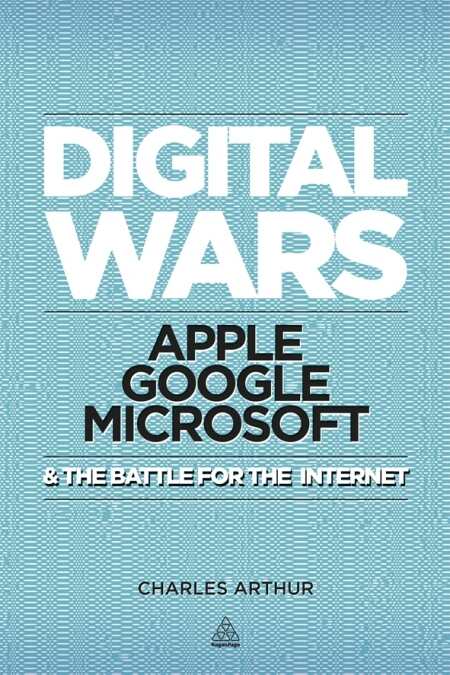Digital Wars
Apple, Google, Microsoft & the Battle for the Internet
Numerous books have been written about the new breed of companies shaping our digital world. Charles Arthur’s offering distinguishes itself because the author, technology editor at the British-based Guardian, shares a journalist’s behind-the-scenes look at the interrelationships among powerhouse companies and their founders.
Digital Wars, as the title implies, is about the immense Internet battlefield and the three primary contenders for digital domination: Apple, Google, and Microsoft. Arthur uses a traditional timeline to structure the book, but it’s his ability to interweave the trials and tribulations of these companies that makes the story fascinating. Arthur includes interviews with company executives, his own observations, and expert commentary to offer insight into both the obvious and subtle differences in corporate management. Microsoft, not surprisingly, comes across as a dominant and dominating bully whose arrogance blinds it to the upstart Google, an innovative search company started by engineers that came along at just the right time. Apple, very much driven by Steve Jobs’s design and marketing acumen, appears to be the most visionary of the lot, rising from the flames of falling computer sales to launch the iPod, iPhone, and iPad, and emerging as a consumer electronics superstar.
Throughout the book, the reader witnesses not only the successes of the three giants, but the stumbles of their competitors. It is clear from Arthur’s narrative that huge opportunities were missed by companies like Yahoo! in the search market, Sony in digital music, and BlackBerry maker RIM in smartphones. But the real meat of the story—the “digital wars” fought by Apple, Google, and Microsoft—takes center stage.
While the author occasionally lapses into technical detail, for the most part he stays true to a journalistic tale of competitive intrigue. Along the way, the reader learns about a multi-faceted battlefield that includes fights over patents, divided loyalties over software platforms, personal relationships that transcend business ruthlessness, and breathtaking one-upmanship, where the risks are as high as the rewards.
Arthur takes the story from 1998, when Apple, Google, and Microsoft “found themselves sharing the same digital space,” he writes, through the Fall of 2011. Fittingly, he ends with the death of Steve Jobs. By the close of the book, it is clear that in little more than a decade, these three companies (and Facebook, which Arthur acknowledges as another major force) have completely changed the manner in which people worked, lived, and communicated via the Internet.
For anyone with an interest in how our digital world has evolved, Charles Arthur’s Digital Wars is required reading.
Reviewed by
Barry Silverstein
Disclosure: This article is not an endorsement, but a review. The publisher of this book provided free copies of the book and paid a small fee to have their book reviewed by a professional reviewer. Foreword Reviews and Clarion Reviews make no guarantee that the publisher will receive a positive review. Foreword Magazine, Inc. is disclosing this in accordance with the Federal Trade Commission’s 16 CFR, Part 255.

